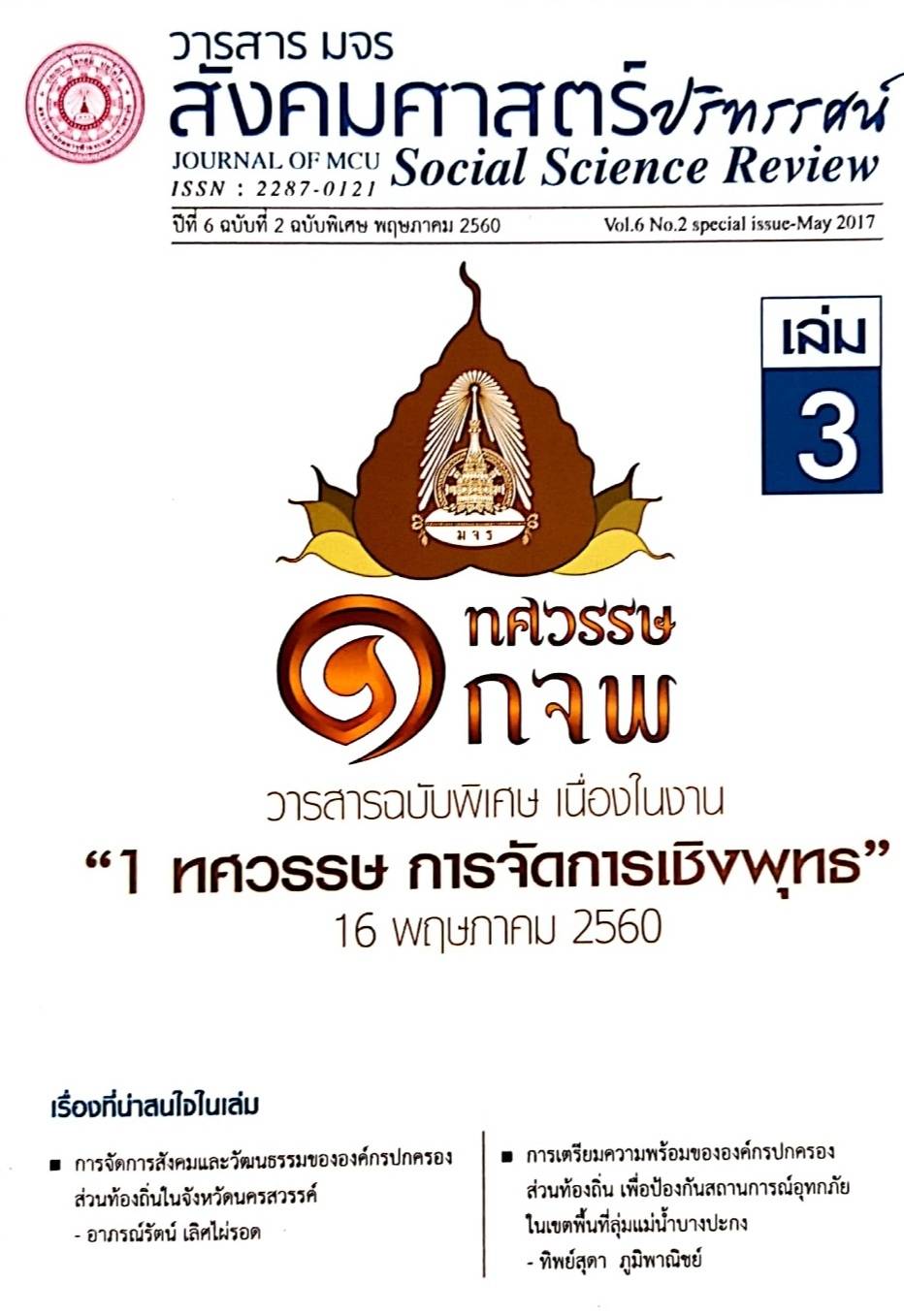การพัฒนาหลักสูตรฝึกอบรมเพื่อเสริมสร้างภาวะผู้นำเยาวชน ของสภาเด็กและเยาวชนแห่งประเทศไทย เพื่อรองรับประชาคมอาเซียน
คำสำคัญ:
หลักสูตรฝึกอบรม, ภาวะผู้นำเยาวชนบทคัดย่อ
งานวิจัยนี้มีวัตถุประสงค์ 1) เพื่อพัฒนาหลักสูตรฝึกอบรมเพื่อเสริมสร้างภาวะผู้นำเยาวชนของสภาเด็กและเยาวชนแห่งประเทศไทย เพื่อรองรับประชาคมอาเซียน 2) เพื่อทดลองใช้หลักสูตรฝึกอบรมเพื่อเสริมสร้างภาวะผู้นำเยาวชนของสภาเด็กและเยาวชนแห่งประเทศไทย เพื่อรองรับประชาคมอาเซียน และ 3) เพื่อประเมินผลการทดลองใช้และปรับปรุงหลักสูตรฝึกอบรมเพื่อเสริมสร้างภาวะผู้นำเยาวชนของสภาเด็กและเยาวชนแห่งประเทศไทย เพื่อรองรับประชาคมอาเซียน กลุ่มตัวอย่าง คือ ผู้นำเยาวชนของสภาเด็กและเยาวชนจังหวัดนนทบุรี จำนวน 28 คน เครื่องมือที่ใช้ในการวิจัย ได้แก่ 1) แบบทดสอบวัดความรู้ 2) แบบวัดเจตคติ 3) แบบประเมินทักษะ/พฤติกรรม และ 4) แบบประเมินความเหมาะสมของหลักสูตร สถิติที่ใช้ในการวิเคราะห์ข้อมูล คือ Independent t-test
ผลการวิจัยสรุปได้ดังนี้ 1) หลักสูตรฝึกอบรมเพื่อเสริมสร้างภาวะผู้นำเยาวชนของสภาเด็กและเยาวชนแห่งประเทศไทย เพื่อรองรับประชาคมอาเซียน ประกอบด้วยเนื้อหา 7 องค์ประกอบ จัดเป็น 6 โมดูล คือ โมดูลที่ 1 การมีบุคลิกภาพที่ดี โมดูลที่ 2 มีทักษะการทำงานเป็นทีม โมดูลที่ 3 มีคุณธรรม จริยธรรม โมดูลที่ 4 มีทักษะการคิด โมดูลที่ 5 เทคโนโลยีการสื่อสารและการแสวงหาความรู้ และ โมดูลที่ 6 ความรู้เกี่ยวกับอาเซียน 2) ผลการทดลองใช้หลักสูตร หลังการอบรมภาวะผู้นำของเยาวชนในสภาเด็กและเยาวชน มีความรู้และเจตคติ สูงกว่าก่อนการฝึกอบรมอย่างมีนัยสำคัญทางสถิติที่ระดับ .05 และผลการประเมินทักษะภาวะผู้นำเยาวชน พบว่า สมาชิกสภาเด็กและเยาวชน ที่เข้าร่วมกิจกรรมฝึกอบรม มีทักษะอยู่ในระดับมากทั้ง 7 ทักษะ และ 3) ผลการประเมินความเหมาะสมของหลักสูตร อยู่ในระดับดีมาก และได้มีการปรับปรุงหลักสูตรฝึกอบรม โดยการขยายเวลาในการฝึกอบรมเป็นเวลา 3 โดยเพิ่มกิจกรรม “สร้างวินัยในการอยู่ร่วมกัน” เพื่อเสริมสร้างความมีวินัยในตนเอง กิจกรรม “ร่วมด้วยช่วยกันสังคมฉันน่าอยู่” เพื่อเสริมสร้างความมีจิตสาธารณะ และเพิ่มกิจกรรม “เรียนรู้กับเกมพับกระดาษ” เพื่อเพิ่มทักษะในการแสวงหาความรู้
เอกสารอ้างอิง
Dhammaruk Karnpisith. (2540). Documentation for a workshop on Thailand Vision 2020. Bangkok: Office of The Nation Economic and Social Development Board.
Jirawat Vongsawatdiwat. (2538). Attitude, Belief and Behavior : resource measurement And change. Bangkok : Assumtion University.
Kanteera Panjathongkome. (2558). The Development of Leadership Training Curriculum for Higher Secondary School Students. Thesis of Master of Education. (Curriculum and Instruction). Rajphatthepsatree University.
Paisan Chanrarapakdee. (2548). Development of Youth Leadership Development for Senior High School Student in High Schools Under The Office of The Basic Education Commission The Ministry of Education Though Curriculum Development. Education Journal 7(1),
Somjai Kongterm. (2550). The Studyof Readiness to ASEAN Community of Students in Phetchabun Rajabhat University. Research Report. Phetchabun : Faculty of Education Phetchabun Rajaphat University.
Thanyaruk Virasombat. (2555). Documentation “Preparation of Graduate Students To support the ASEAN community”, Rajaphat Chiangmai University.
Worawut Jerasujarittum. (2010). A Development of Enrichment Curriculum to Promote Youth Leadership Skills in Catholic Vocational Schools. Dissertation, Ed.D. (Educational Administration). Bangkok: Graduate School, Srinakharinwirot University.
ดาวน์โหลด
เผยแพร่แล้ว
รูปแบบการอ้างอิง
ฉบับ
ประเภทบทความ
สัญญาอนุญาต
ลิขสิทธิ์ (c) 2020 วารสาร มจร สังคมศาสตร์ปริทรรศน์

อนุญาตภายใต้เงื่อนไข Creative Commons Attribution-NonCommercial-NoDerivatives 4.0 International License.
เพื่อให้เป็นไปตามกฎหมายลิขสิทธิ์ ผู้นิพนธ์ทุกท่านต้องลงลายมือชื่อในแบบฟอร์มใบมอบลิขสิทธิ์บทความให้แก่วารสารฯ พร้อมกับบทความต้นฉบับที่ได้แก้ไขครั้งสุดท้าย นอกจากนี้ ผู้นิพนธ์ทุกท่านต้องยืนยันว่าบทความต้นฉบับที่ส่งมาตีพิมพ์นั้น ได้ส่งมาตีพิมพ์เฉพาะในวารสาร มจร สังคมศาสตร์ปริทรรศน์ เพียงแห่งเดียวเท่านั้น หากมีการใช้ภาพหรือตารางหรือเนื้อหาอื่นๆ ของผู้นิพนธ์อื่นที่ปรากฏในสิ่งตีพิมพ์อื่นมาแล้ว ผู้นิพนธ์ต้องขออนุญาตเจ้าของลิขสิทธิ์ก่อน พร้อมทั้งแสดงหนังสือที่ได้รับการยินยอมต่อบรรณาธิการ ก่อนที่บทความจะได้รับการตีพิมพ์ หากไม่เป็นไปตามข้อกำหนดเบื้องต้น ทางวารสารจะถอดบทความของท่านออกโดยไม่มีข้อยกเว้นใดๆ ทั้งสิ้น





